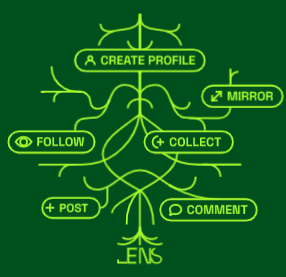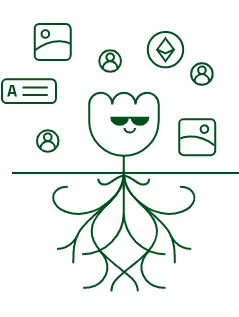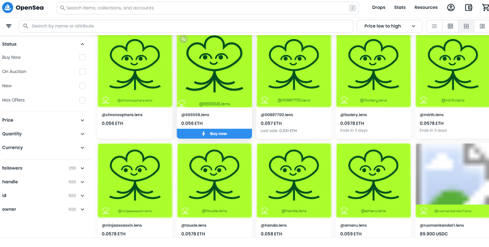Fiat-Währungen
Kryptowährungen
What Is Lens Protocol and How Does It work?
At the dawn of the 21st century, the concept of social media was still only an idea. But shortly after, it became reality and the world was changed in many ways, especially in terms of how people socially interact. Central to this phenomenon was the online social graph, which is a data structure that shows the relationships between users of social networks. Though many social media networks are centralized, meaning that users don’t have full control over their relationships, Web3 technology is bringing a platform to the table that will change the face of social media: Lens Protocol. This article will discuss what Lens Protocol is, and how it works.
What Is Lens Protocol?
Lens Protocol is an open-source, blockchain-powered social graph that seeks to revolutionize social media in the age of Web3. Unlike Web2 social media platforms, such as Twitter or Facebook, which employ centralized social graphs to create connections between users of social networks, Lens Protocol is designed to be permissionless and composable, allowing content creators to own their digital content and giving people complete control over the connections between themselves and their communities.
Developed by the well-known Aave team in early 2022, Lens Protocol quickly gained attention in the blockchain and crypto communities. Aiming to address the significant flaws of the current social media landscape, Lens Protocol has been gradually building a base of dedicated users of a Web3-ready community. With this new protocol, users can monetize their content and gain back control of their information and connections.

How Does Lens Protocol Work?
Web 2 social media works by centralizing social media graphs, allowing data to be accessible only to centralized services. This limits the ability of users, projects, and third parties to incorporate the service into their own. Furthermore, the network operators keep and lock up all profiles, content, and connections, making it difficult to access when the single server becomes inaccessible. As a result, the centralized service is vulnerable to weak access and potential failure.
Unlike centralized social media, a graph database (GDB) is utilized by Lens Protocol to establish its social graph. This graph structure consists of individual nodes, edges that represent connections between them, places, things, and other properties to store data. The graph visually illustrates the network members and the relationships between them. Lens Protocol's open social graph architecture allows blockchain-based social media platforms and DApps to utilize its decentralized applications (DApps) for building social networking. By connecting to Lens Protocol, blockchain-based social media platforms and DApps can access its social networking capabilities. Furthermore, Lens Protocol's modular architecture enables users to take advantage of the most up-to-date features and ensures the security of their content and networks of contacts.
Why Lens Protocol?
Lens Protocol seeks to challenge the status quo of existing social media networks by providing a decentralized, blockchain-based infrastructure. Through this infrastructure, users can own their identities, profiles, and data and have it securely stored on the blockchain. This allows users to access their data from any network, and even port their profiles and friends to new networks. This will shift the focus away from a zero-sum game, and instead create an open social media ecosystem where users are truly in control of their data.
Lens Protocol allows users to be the true owners of their data, giving them the freedom to bring their content to any application built on the platform. This eliminates the risk of losing their content, audience, and livelihood due to the policies and algorithms of an individual platform. Moreover, each application that uses Lens Protocol benefits the entire ecosystem, transforming the competitive dynamic into a cooperative one. Developers can create meaningful social experiences without relying on feedback mechanisms to retain their users' attention.
What Are the Features of Lens Protocol?
NFTs are at the core of the Lens Protocol, enabling users to create, manage, and own their personal profile data. Polygon's layer 2 scaling solution provides a low-cost way to store all of the data associated with these profiles. This architecture enables users to have full control over their content, as all posts and changes are stored on-chain. This ensures that no single party can have exclusive access to the content and that all posts and changes are visible and accessible to anyone. Furthermore, users can benefit from the immutability of the blockchain, which guarantees that their content will remain unchanged and secure.
Lens Protocol features modules, which enable users to add custom functionality to the system. These modules are whitelisted smart contracts that are executed when certain conditions are met. Modules can be created to represent the action of a user following another profile, as well as reference modules that allow users to interact with and comment on other users' posts. This modular structure not only makes it easier to design and use Lens Protocol, but it also allows us to create functionalities that are adaptable to our applications and the needs of users.

How to Use Lens Protocol?
On Lens Protocol, users begin their journey by creating their own Profile NFT. This unique asset grants them ownership over their data and activities, allowing them to post, share, comment, and follow other profiles. The Profile NFT keeps track of all the user's publications, reposts, comments, and other content generated. Users can also link and communicate with their friends and opinion leaders. All of this is enabled by the use of blockchain technology, smart contracts, and NFTs, creating a Web3 social media experience.
The Profile NFT on the Lens Protocol offers users a unique Follow feature that is slightly different from traditional Web2 social media. With this feature, different accounts can mint Follow NFTs to record their connections. When someone follows a profile, they receive a Follow NFT that can be encoded with additional value by creators and communities. Lens Protocol users can monetize their content through the Collects feature by setting a Collect option when posting a publication to their Profile NFT. As creators own their content through the Lens Protocol, they can choose to sell it to their followers under their own terms and conditions.
How to Get a Lens Protocol Handle?
The Lens Protocol handle is similar to the Twitter handle. You can claim the Lens Protocol handle from the Lens Protocol site: https://claim.lens.xyz/ However, this is only eligible for people who have signed the letter with their address on Lens Protocol's official site before May 5th,2022.

If not, you can buy the Lens Protocol handle from Opensea Marketplace: https://opensea.io/collection/lens-protocol-profiles

Closing Thoughts
In the 21st century, social media platforms have become ubiquitous. Unfortunately, the centralized nature of these networks has led to a number of flaws, including a lack of data ownership rights for users, censorship, and the ability of the platform to take down profiles that default on their policies. Web3, through Lens Protocol, offers a decentralized way for users to take ownership of their data, customize their experience, and bypass the restrictions of centralized networks.
Stay tuned to CoinCarp Social Media and Discuss with Us:
- How Telegram Bots Are Shaping the Next Frontier of On‑Chain UX Anfänger Jul 22, 2025 3m
- Is BYDFi the Right Exchange for You in 2025? Here’s What to Know Anfänger Jul 16, 2025 4m
- Decentralized by Design: What Non-Custodial Gaming Reveals About Peer-to-Peer Innovation Anfänger Jul 16, 2025 3m
- 12 Best Crypto Lottery Sites [2025] Anfänger Jul 11, 2025 12m